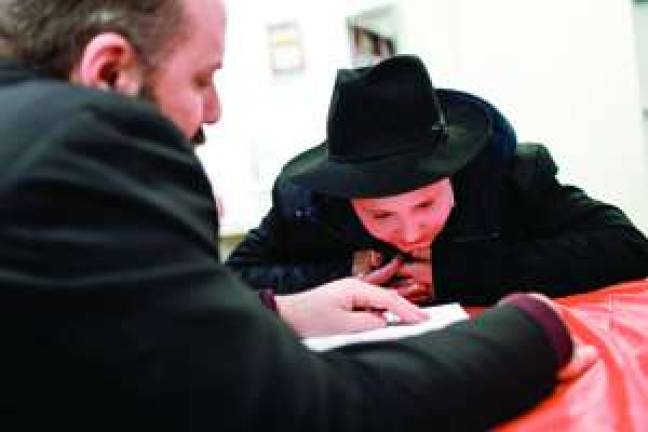Sixteenth Street Synagogue Narrowly Avoids Eviction

Threatened with ouster, the 67-year-old congregation fights back in the courts By Caroline Lewis Last week, a long- coming eviction notice posted on the door of Manhattan's Sixteenth Street Synagogue finally confronted its president, Richard McBee: He had five days to clear out the space that has housed the congregation's services and spiritual life ever since the synagogue was founded in 1945. Developer Jack Braha, who purchased the building in 2005, is constructing high-end apartments on the building's top four floors and aims to transform the first floor, currently occupied by the synagogue, into a lobby, storage and commercial space. "There cannot be an eviction of a synagogue in the heart of Manhattan that's running, that's functioning, that's serving a community. As it were, that can't happen," McBee said. It was two days after the notice was issued, and McBee was about to join several congregants in the synagogue's main sanctuary for their regular morning study of the Talmud, a religious text. "Does it look like, yeah, the law says it can happen? Sure, but the law's not the whole story," he said. McBee's message was clear: The congregation would stay and fight. Days later, in an unexpected turn of events, the New York State Supreme Court gave them the opportunity to do just that. Justice Martin Shulman placed a Temporary Emergency Stay on the eviction of the synagogue, pending a decision on their claim that they own one third of the building. The synagogue's lawyers will have a chance to argue the claim in court on Jan. 8. Braha's attempt to oust the synagogue is the latest in a long dispute over the highly valued property at 3 W. 16th St. In the 1940s, the building was the headquarters of the National Council of Young Israel, an umbrella organization that created the Sixteenth Street Synagogue-also known as the Young Israel of Fifth Avenue-as their model synagogue. Fast forward to the 2000s, and the National Council was deeply in debt and sitting on a property on Fifth Avenue during the real estate bubble. It was time to sell, and the Sixteenth Street Synagogue, though they tried, could not afford to buy. The solution seemed to come as a godsend from Steven Ancona, a real estate developer and member of the Sephardic congregation that occupied the second floor of the building at the time. Ancona reached out to Braha, whom he had worked with before, and proposed that they rent out units on the top four floors, leaving the bottom two floors for use by the Sixteenth Street Synagogue. Braha agreed and was able to purchase the building at well below market value as a result of the synagogue's ongoing litigation with the National Council of Young Israel, said a synagogue board member, who wished to remain anonymous. For tax purposes, Braha would be the sole owner of the property. "Steven Ancona was honored at the dinner [held by the synagogue] as the white knight, and Jack Braha was also there and honored," McBee said. But as Braha and Ancona's relationship deteriorated, construction slowed and Braha began to back down from the original agreement with the Sixteenth Street Synagogue. "The tenant didn't perform, and I evicted Ancona," Braha told The Real Deal earlier this month, adding that he would allow the congregation to remain in the building if they paid rent at the market rate. Neither Braha nor his attorney could be reached for comment on the latest developments in the dispute. With the synagogue's name absent from both the original deed and the deal between Braha and Ancona, their claim to partial ownership has been an uphill battle. "The synagogue, unfortunately, didn't sign anything," said the board member. "Both Steve and Jack Braha recognized at the time that we were co-owners. But that argument didn't hold in court." McBee is hoping it will now. "If denied [a continuation of the Temporary Stay on eviction], at that time we will appeal to the Appellate Division," he said.